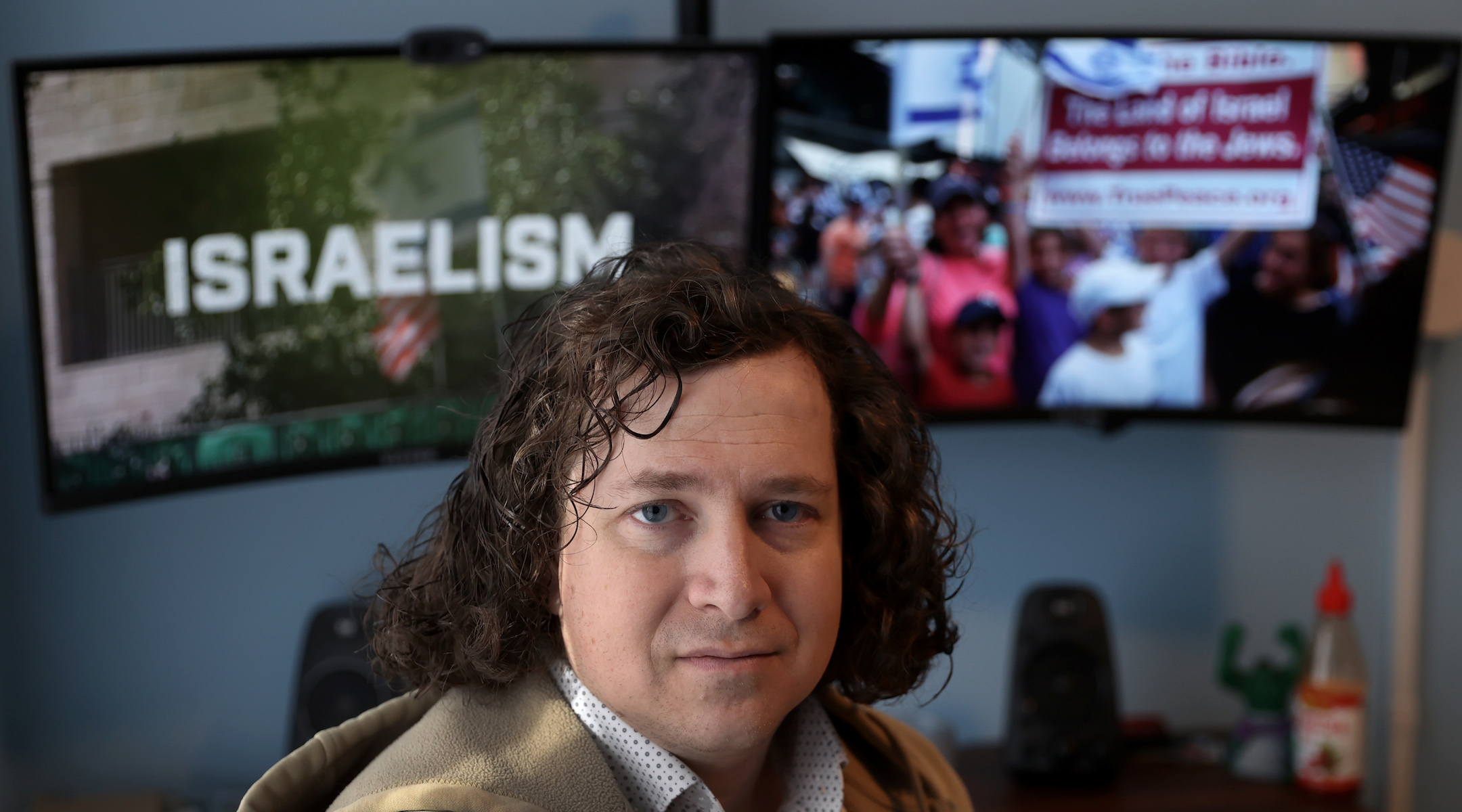‘Israelism,’ the progressive Jewish documentary roiling college campuses, gets digital release
A Palestinian-owned distributor is releasing the film about Jewish divisions over Israel

Jewish pro-Palestinian activists protest Birthright in a scene from the documentary “Israelism” (Tikkun Olam Productions)
They wanted to capture a growing Jewish generational divide over Israel. The Jewish makers of “Israelism” accomplished that — and then some.
Over the last seven months, the documentary critiquing the American Jewish relationship to Israel has become something closer to a foundational text for the campus pro-Palestinian movement. It’s been screened at more than 100 colleges, including several encampments. It has toured overseas and won support from an array of Jewish groups on the left, from the liberal J Street to avowed anti-Zionists.
Fights over campus screenings have spilled over into public view, fueling the film’s accusations that the institutional Jewish community is incapable of weathering any criticism of Israel.
This week, following some previous small windows of online availability, “Israelism” is getting a full digital release. A movie made to prompt a difficult Jewish conversation is now being distributed by Watermelon Pictures, a Palestinian-owned company (the watermelon has become a popular symbol for Palestinian rights) with the motto, “From the river to the screen, Palestine will be seen.”
“So ready for the world to see this incredible documentary,” Watermelon Pictures posted on Instagram Monday. “May this film, and the shift in collective consciousness it has fostered, become a milestone in the history of humanity.”
The company is led by Alana Hadid, sister to Palestinian celebrity models and activists Bella and Gigi Hadid; it’s making “Israelism” available to rent on all digital platforms Friday, including iTunes and Vimeo.
“We weren’t specifically looking for a Palestinian-owned label,” “Israelism” co-director Erin Axelman told JTA in a recent interview. But, they said, Watermelon’s mission was in keeping with the spirit of their film: “We think it models how Palestinians and Jews can work together for freedom and justice for all people, between the river and the sea.”
That kind of provocative messaging is at the heart of “Israelism,” the debut film from Axelman and co-director Sam Eilertsen that premiered in February 2023 under their production company Tikkun Olam Productions. Years in the making, the 85-minute documentary focuses on the political evolution of two millennial Jews who began as uncritical backers of Israel and have become pro-Palestinian activists.
Pro-Israel Jews have claimed the film promotes or justifies left-wing antisemitism under the guise of Israel criticism. But the documentary’s central subject says the opposite has been the case: Pro-Palestinian progressives who see it often develop a greater empathy for the nuances within the Jewish community.

Simone Zimmerman in a scene from the documentary “Israelism” (Tikkun Olam Productions)
“I’ve actually experienced a lot of non-Jews who have watched the film, for whom it really complicates their understanding of what is happening in the Jewish world,” Simone Zimmerman, the film’s protagonist and a co-founder of the Israel-critical Jewish activist group IfNotNow, told JTA. “I think it does give them a more nuanced understanding of what is going on for American Jews within this political moment.”
The film chronicles Zimmerman’s upbringing in a committed Zionist environment before pivoting in college to become a pro-Palestinian activist. (Today she works for Diaspora Alliance, an international progressive Jewish networking organization, and is one of the leading Jewish voices publicly criticizing Israel.)
Another central figure, who goes by “Eitan,” is an American veteran of the Israel Defense Forces who comes to regret his participation in the military’s treatment of Palestinians and joins up with Breaking the Silence, an activist group for IDF veterans.
The thesis of “Israelism” is that institutional Jewish efforts to inculcate a love of Israel in the next generation — including Jewish day schools, Jewish summer camps, Birthright and Hillel — have blinded young Jews like Zimmerman and Eitan to the realities of life for Palestinians under Israeli occupation. It also argues that pro-Israel advocates have weakened the fight against antisemitism more broadly by conflating it with any criticism of Israel.
For an opposing perspective, the directors interview institutional pro-Israel Jewish figures, including Abe Foxman, director emeritus of the Anti-Defamation League, and Rabbi Bennett Miller, a past chair of the Association of Reform Zionists of America, a branch of the Union for Reform Judaism. Foxman last summer called the finished movie “an anti-Israel and anti-American Jewish community film,” tweeting, “I regret being part of this.”
Other Jewish critics of the film have said it oversimplifies a difficult history: Gary Rosenblatt, a former editor of the New York Jewish Week, wrote on Substack that the movie has “distorted and biased views of the Israel-Palestinian conflict,” accusing it of glossing over much of Israeli history (including the Six-Day War and the Second Intifada) in order to “cast the Jewish State as the clear villain.” (Rosenblatt still concluded that, despite its flaws, the movie is “a damning critique of how we teach about Israel.”)
But the filmmakers say the “Israelism” narrative reflects their own experience. Axelman grew up in rural Maine around few Jews; in that environment, they said, learning about Israel was “incredibly empowering” and “inspiring.” They used to be proud to count Israeli Prime Minister Levi Eshkol (who led the nation during the Six-Day War) among their distant relatives. Axelman was first exposed to the Palestinian narrative as a student at Brown University, where Eilertsen was a classmate.
They began work on the documentary in 2016, a time when IfNotNow, Jewish Currents and other drivers of the contemporary Jewish left were entering the public consciousness. Multiple producers on the film are, like Eitan, IDF veterans; others are Palestinian. They also sat down with the staff of a university Hillel, and have strong words about the organization as a whole.
“In the film, we show there’s an Israel Fellow who is working out of Hillel on a college campus, but being paid by the Israeli government to talk to students on campus about Israel and organize pro-Israel events,” Eilertsen said, referring to a common position on campus Hillel staffs that is funded by the Israeli government. “It’s hard for me to describe that as anything other than propaganda.”

Erin Axelman, co-director of the documentary “Israelism,” in Somerville, Massachusetts, Jan. 19, 2024. (David L. Ryan/The Boston Globe via Getty Images)
Made in a pre-Oct. 7 world, “Israelism” doesn’t mention Hamas and barely touches on pro-Palestinian protest tactics. Yet the film still found itself a central agent of activism soon after Israel’s military campaign in Gaza began in response to Hamas’ attack, in which approximately 1,200 people were killed and some 250 hostages taken captive. An estimated 36,000 people have since been killed in Gaza, more than a third of whom Israel says are Hamas fighters, as well as close to 300 Israeli soldiers.
Initially, the filmmakers paused screenings for a week. “We were incredibly shocked and horrified,” Axelman recalled, noting that they and other crew members had personal connections to people who “were murdered by Hamas.” But they soon regrouped for a previously planned campus tour, which kept growing as more organizations requested to show the film.
Initially they tried to pair every screening with a Q&A session to more carefully control the tenor of dialogue. At these screenings, the directors said, they made efforts to comment on antisemitism on the left as well as the right. But they were also contending with more organized pro-Israel pushback to the film.
At a handful of schools, including Hunter College, the University of Pennsylvania and Barnard College, administrators intervened to halt planned screenings. Politicians began openly labeling the film antisemitic. Recent lawsuits filed by Jewish students against elite colleges, alleging the schools have allowed antisemitic environments to fester on campus, pointed to screenings of the film as supporting evidence.
The 50,000-member Facebook group Mothers Against College Antisemitism mounted letter-writing campaigns targeting universities that scheduled showings of it, with form letters stating, “The movie openly gives justification to those shouting ‘Kill the Jews,’ ‘Globalize the Intifada,’ etc.” In Hamilton, Ontario, a planned community screening was briefly canceled following pressure from the local Jewish federation, which months later would see its own planned Israeli film screening briefly canceled following a left-wing pressure campaign.
Hillel, which comes under heavy scrutiny in the film and is a growing target of the pro-Palestinian left, has also kept its distance from the movie. A planned J Street U screening at Yale’s Hillel center in December, which would have been the film’s first Hillel-sanctioned event, was scrapped following pushback. According to emails and audio shared with JTA, a representative from Yale Hillel’s Slifka Center initially approved the screening, before — according to J Street U representatives — Hillel International intervened to stop it. The film was later shown at another campus venue; no Hillel has shown it since.
Slifka Center director Uri Cohen told JTA that in lieu of the film screening, Hillel had hosted a “thoughtful critique” from Yehuda Kurtzer, president of the Shalom Hartman Institute think tank. Cohen added that the center “does not believe the Israelism documentary reflects our values as an institution committed to respectful inquiry, dialogue across difference, and critical analysis; we believe the film is deeply biased, inaccurate in many respects, and can be used to promote hatred of the Jewish state.”
Asked about the incident, a Hillel International spokesperson shared a statement on “Israelism” the organization released in the fall that said it “does not authentically reflect the lived experiences of so many of the tens of thousands of Jewish college students who participate in Israel programming and education through Hillel each year.”
Hillel also charges that the film “contains a number of inaccuracies and distortions, such as failing to meaningfully show Jewish historical and ancestral ties to Israel, and holding American Jews accountable for the actions of the state of Israel –- the same tropes that have led to the record-breaking rise in antisemitism that Jewish students have experienced on college campuses this school year.”
“Israelism” eventually screened at all those campuses, but not without added controversy. Hunter’s screening turned into a showdown between audience members and a liberal rabbi who served as moderator, with the rabbi claiming he was harassed while others said he had adopted a needlessly combative posture toward the film. And at Penn, student groups screened it without the university’s approval, leading to threats of discipline and the resignation of the school’s Middle East Studies department head.
Amid such tensions, the directors have also embraced their newfound status as thought leaders of the Jewish left.
“The interest in the film has become so large, we have had so many press requests, that we’ve kind of become spokespeople ourselves,” Axelman said. The “Israelism” Instagram page now has 110,000 followers, with Axelman making a stream of short-form video content to promote both the film and pro-Palestinian talking points. Axelman also recently testified before the Hawaii state Senate in favor of a proposed resolution calling for a ceasefire.
Most of the campus controversies around “Israelism” have quelled as the film enters digital release, and Axelman and Eilertsen are turning their attention to a new documentary about climate activists. Asked how they might approach “Israelism” differently today, as violence in the region drags on, they say the answer depends on when the war ends.
“If there was a ceasefire right now, there’s one story that we could tell encapsulating Oct. 7 and the aftermath. And it would be, obviously, one of absolute horror, both from Israeli civilian deaths as well as of Palestinian deaths,” Eilertsen said. “But it may get far, far, far worse.”
For Zimmerman, who has spent the decade helping to build the current movement of young progressive Jews vocally opposing Israel’s actions that has so antagonized mainstream Jewry, teaching this cohort where they came from is also part of the film’s legacy.
“I think it has been really empowering for young Jews who see their Jewish values and their Jewish identity as motivating them to speak out against what’s happening in Gaza and to support the movement for Palestinian freedom,” she said. “The film breaks down a lot of how we got to this moment.”
This article originally appeared on JTA.org.














